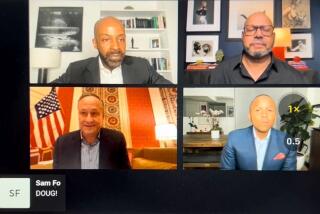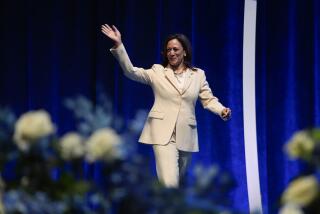Senate Panel Rejects Clarke as Comptroller : Banking: The partisan vote is seen by some as a blast at the Administration, which has come under fire for its domestic economic policies.
The Senate Banking Committee, split by a bitter debate, voted Wednesday to reject the nomination of Comptroller of the Currency Robert L. Clarke for a second term, offering a partisan rebuff to the Bush Administration’s economic policies.
With the presidential election less than a year away and the economy troubled by a scarcity of credit, Clarke became a symbol of political controversy transcending his job as regulator of 3,900 nationally chartered banks, which hold nearly two-thirds of the industry’s assets.
Democrats assailed him as a do-nothing official who failed to crack down on banks that were making bad and risky loans. Republicans defended him as a good regulator fallen victim to Democratic spite and vendettas.
The committee voted along strict party lines, with 12 Democrats rejecting the nomination, while nine Republicans supported it. The committee has never previously rejected a nominee for a major financial regulatory position, according to research by staff members. “Occasionally you have to send a message, and maybe this is the only way you get through,” said an angry Sen. Christopher J. Dodd (D-Ct.). “Unfortunately, Bob Clarke is the messenger.”
Dodd contended that his state has lost more jobs in the past 15 months than at any time since the end of World War II. When New England businesses complained that tough-minded regulators were causing a credit crunch, “all we got was polite conversation,” he said.
However, Republicans complained vociferously that Clarke is a hapless victim. Treasury Secretary Nicholas F. Brady denounced the committee action as “shameful.”
“This is crass politics and partisanship at its worst,” Brady said. “It is the time-honored duty of the Senate to advise and consent; it is another thing to engage in character assassination and persecution.
“On a practical level, it makes no sense to take this action when credit availability is lacking, the economic recovery is sluggish and the American people ask for leadership.”
President Bush, under fire for not giving enough attention to domestic economic issues, must now provide a new nominee for the key regulatory post. Clarke, who could not be reached for comment, can remain in the position until a replacement is found.
There has been speculation that Bush might pick Timothy Ryan, director of the Office of Thrift Supervision, the agency that oversees the nation’s savings and loans, as a successor. Administration officials would not comment on a new nominee Wednesday.
Republican members of the banking committee were chafed by the rejection. Sen. Christopher Bond (R-Mo.) accused the Democrats of “looking for a scapegoat. Is Bob Clarke to be hung for the credit crunch?” he asked, referring to the reduction of lending in the current recession.
Bond said the vote to reject Clarke will be a message to federal bank examiners that “you have not been tough enough. They’re going to see the lead federal regulator pilloried because he wasn’t tough enough.”
Clarke has served as comptroller since 1985 and was nominated in January for a second five-year term. The committee conducted an intensive investigation of his policies as comptroller, particularly his oversight of troubled banks in Texas and New England.
“During his tenure, national banks have failed in numbers not seen since the Great Depression,” said committee Chairman Donald Riegle (D-Mich.). “This has been the largest single cause of the pending bankruptcy of the deposit insurance fund, creating an immediate need for a $70-billion loan from taxpayers.”
He said Clarke was negligent in his duties by allowing banks to invest heavily in risky loans for commercial real estate development and construction. After consulting with the six biggest banks in Texas in 1987, Clarke “loosened the standards for accounting for troubled real estate loans,” Riegle said.
The Democrats also accused Clarke of allowing the Bank of New England, which failed and will cost the taxpayers more than $2 billion as the third-biggest bank collapse, to become too heavily involved with real estate lending.
Ironically, while being attacked by the Democrats for being too soft a regulator, Clarke also was pilloried as too tough by many bankers and business executives, particularly from New England, who had denounced him as the “regulator from hell.” White House Chief of Staff John Sununu tried to block his renomination earlier this year but was overruled when Brady made a personal appeal to President Bush.
In a separate vote, the committee approved the nomination of Susan Phillips to be a governor of the Federal Reserve. Phillips is former chairwoman of the Commodity Futures Trading Commission.
The panel also approved the nominations of David Bradford and Paul Wonnacott to be members of the President’s Council of Economic Advisers.
CALFED IN MERGER TALKS. D2
More to Read
Get the L.A. Times Politics newsletter
Deeply reported insights into legislation, politics and policy from Sacramento, Washington and beyond. In your inbox three times per week.
You may occasionally receive promotional content from the Los Angeles Times.






